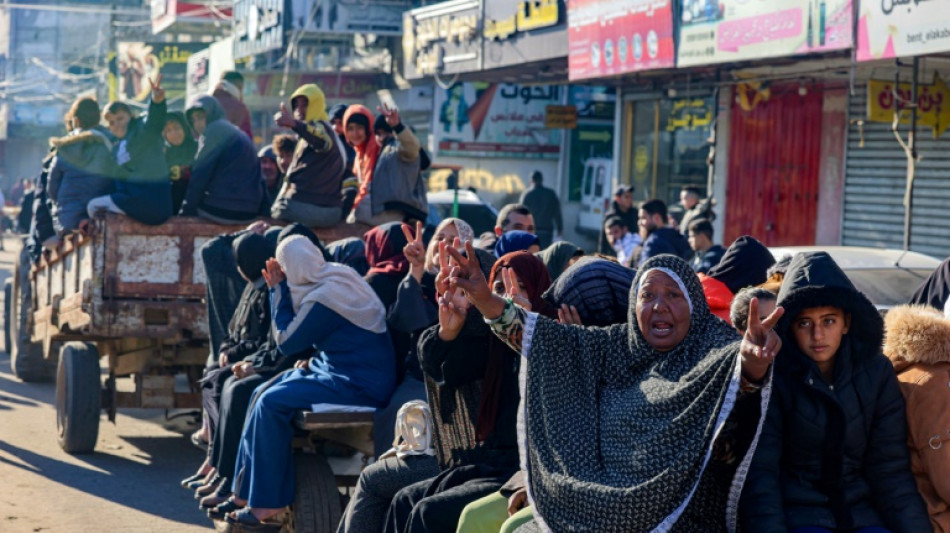

Hamas weighs Gaza truce as deadly fighting nears fifth month
Israeli strikes across Gaza killed scores overnight as battles raged Sunday in the besieged territory's south and Hamas was reviewing a proposal for a halt in the nearly four-month-long war.
France's top diplomat Stephane Sejourne began his first Middle East trip as foreign minister, aimed at pushing for a ceasefire and hostage release, a ministry spokesman said, with US Secretary of State Antony Blinken also expected in the region in the coming days.
The health ministry in the Hamas-ruled territory said overnight Israeli strikes had killed at least 92 people.
An AFP journalist reported strikes and tank fire on Khan Yunis, southern Gaza's main city, with some air raids also hitting further south in Rafah, a border city teeming with Palestinians displaced by the fighting since early October.
Israel has warned its ground forces could advance on Rafah, where hundreds of thousands of people seeking refuge from the fighting shelter in makeshift encampments.
The army said Sunday its troops raided "a compound used by the commander of Hamas's Khan Yunis brigade" and seized weapons, also confirming air and naval strikes on the city.
It reported several militants had been killed after attempting to attack Israeli troops.
With the war set to enter a fifth month on Wednesday, international mediators were pressing to seal a proposed truce deal thrashed out in a Paris meeting of top US, Israeli, Egyptian and Qatari officials.
- Gaza rendered 'unlivable' -
But a top Hamas official in Lebanon, Osama Hamdan, said on Saturday that the proposed framework was missing some details.
The group needed more time to "announce our position", Hamdan said, "based on... our desire to put an end as quickly as possible to the aggression that our people suffer".
A Hamas source had said the proposal involves an initial six-week pause that would see more aid delivered into the Gaza Strip and exchanges of some Israeli hostages for Palestinian prisoners held in Israel.
The war was sparked by Hamas's unprecedented October 7 attack on Israel, which resulted in the deaths of about 1,160 people, mostly civilians, according to an AFP tally based on official figures.
Militants also seized around 250 hostages, and Israel says 132 remain in Gaza, including at least 27 believed to have been killed.
Vowing to eliminate Hamas, Israel launched a massive military offensive that has killed at least 27,365 people in Gaza, mostly women and children, according to the Hamas-ruled territory's health ministry.
Rafah, once home to 200,000 people, now hosts more than half of Gaza's population, the United Nations said.
"We are exhausted," said displaced Gazan Mahmud Abu al-Shaar, urging "a ceasefire so that we can return to our homes".
Experts and rights groups told AFP that Israeli forces have systematically destroyed buildings near the border in an attempt to create a buffer zone inside the Palestinian territory.
Israel has not publicly confirmed the plan, which Nadia Hardman, a refugee rights expert at Human Rights Watch, said "may amount to a war crime".
"We are seeing mounting evidence that Israel appears to be rendering large parts of Gaza unlivable," she said.
Adi Ben Nun, a professor at Jerusalem's Hebrew University who has carried out an analysis of satellite imagery, said more than 30 percent of structures inside Gaza with a kilometre (0.6 miles) of the Israeli border have been damaged or destroyed during the war.
- 'Price goes up' -
Concern for hostages still in Gaza and security failures surrounding the October 7 attack -- the deadliest in Israel's 75-year history -- have led to criticism of Prime Minister Benjamin Netanyahu and rallies against the government.
Michal Hadas, protesting in Tel Aviv on Saturday night, told AFP she feared Israel's leaders were dragging out the conflict for political reasons, "because as long as the war continues there will be no election".
At a rally for hostages' families, Carmit Palty Katzir, sister of captive Elad Katzir, called for swifter action.
"Every second a deal is not closed, the price goes up. The number of hostages who won't return alive goes up. The number of soldiers risking their lives without a clear plan for the day after goes up," she said.
The war has sent regional tensions soaring, with a surge in attacks by Iran-backed groups in solidarity with Gaza triggering counterattacks by key Israel ally the United States.
The United States and its partner Britain said they struck dozens of targets in Yemen late Saturday in response to repeated attacks on shipping by Iran-backed Huthi rebels.
A Huthi spokesman said the latest wave of air strikes "will not deter us", while Tehran said the attacks contradicted "the repeated claims of Washington and London that they do not want the expansion of war and conflict in the region".
burs-ami/dcp/hkb
P.Ortega--LGdM




